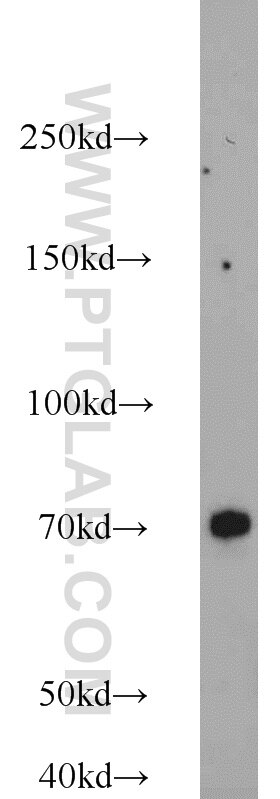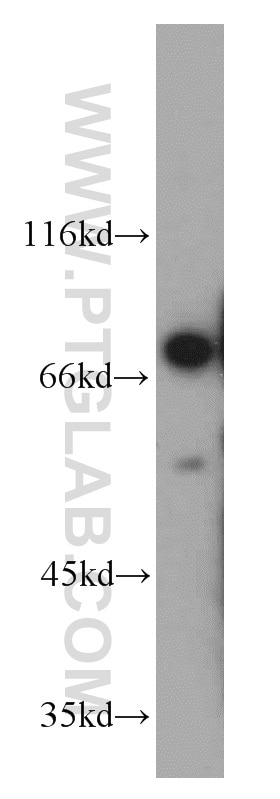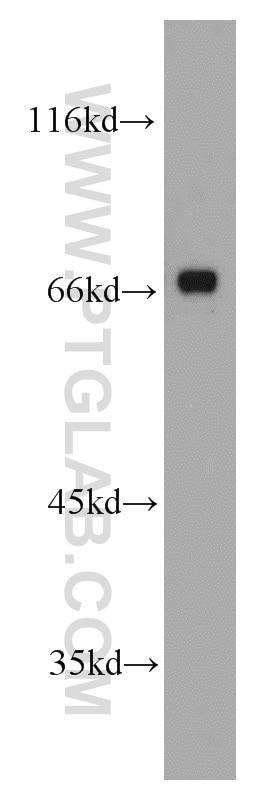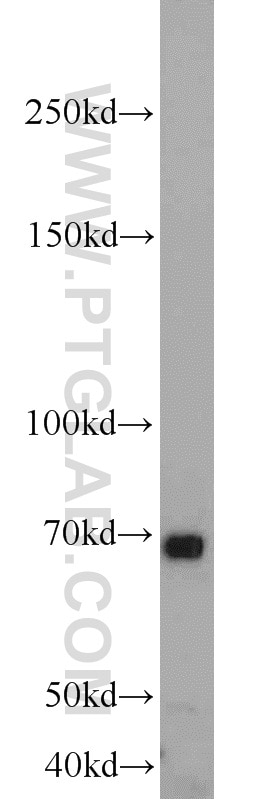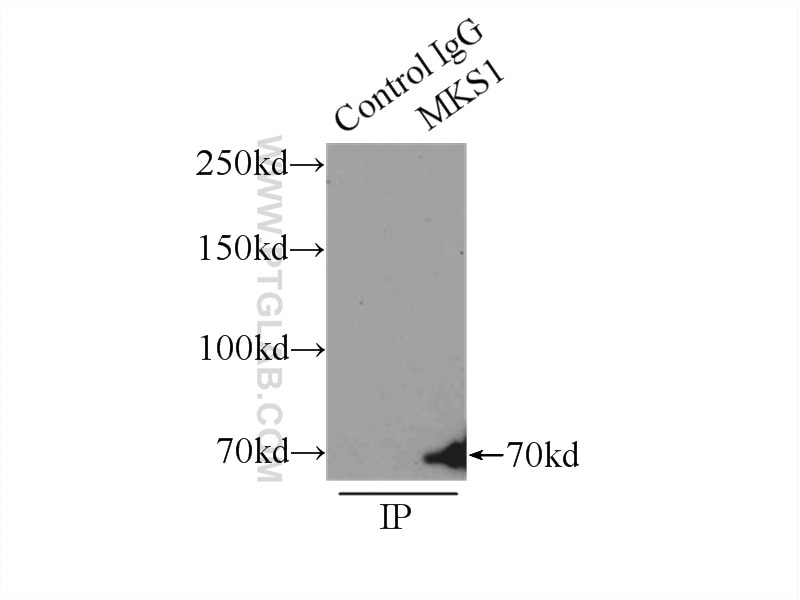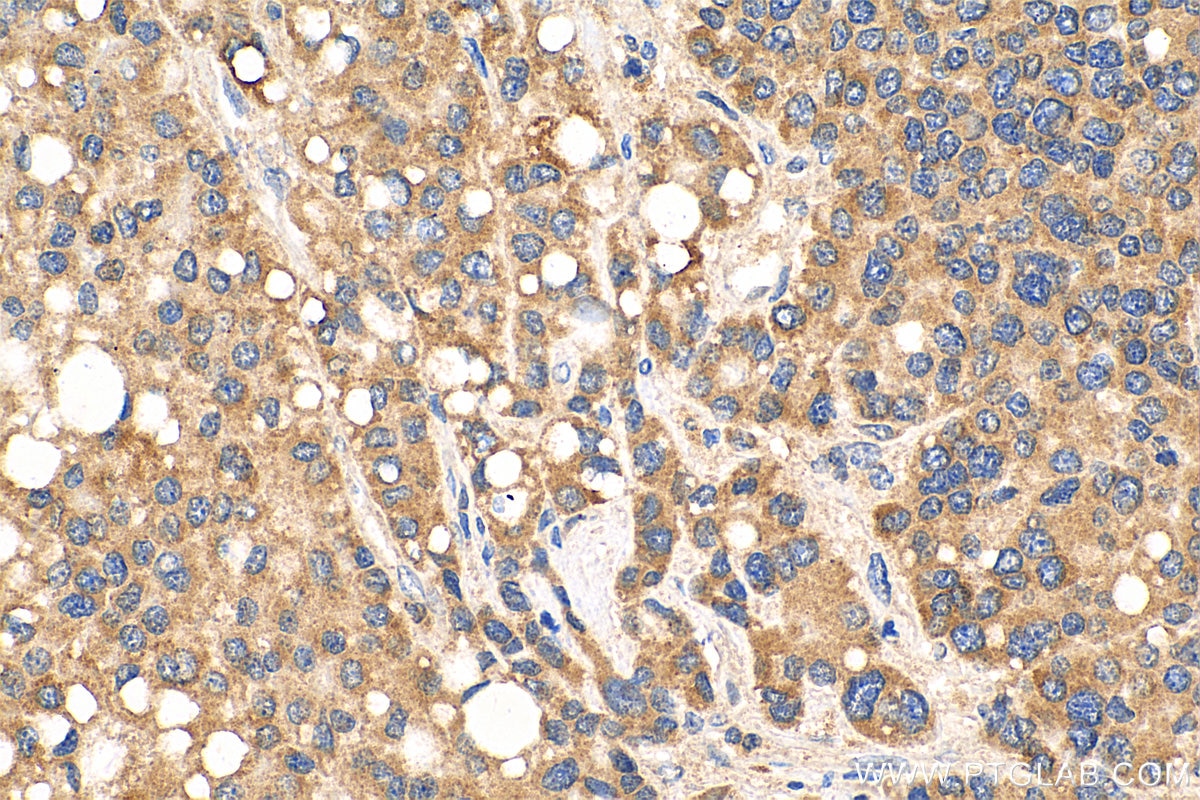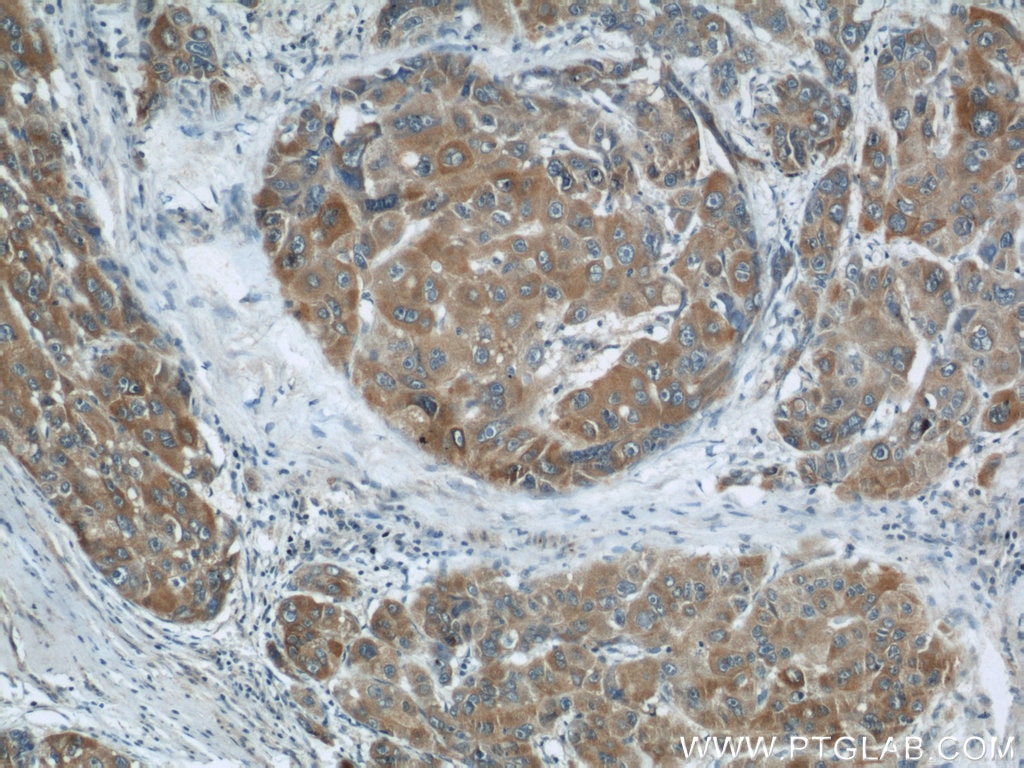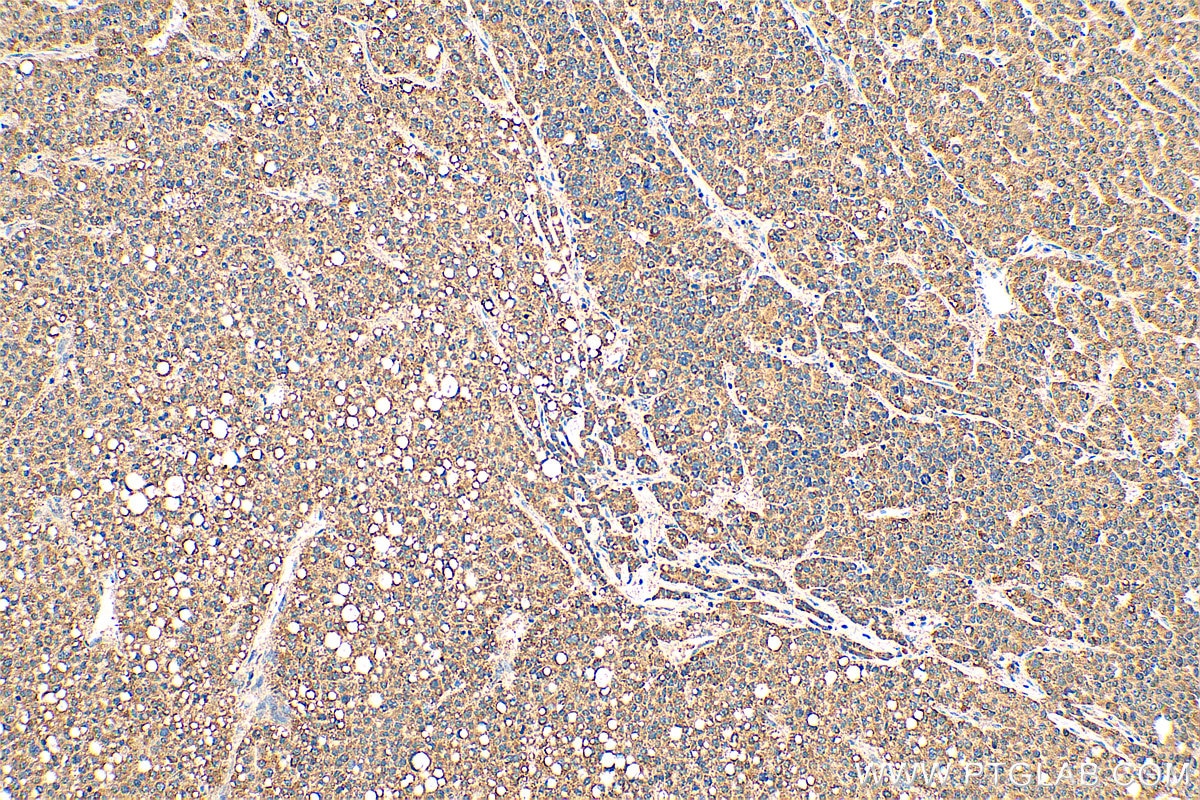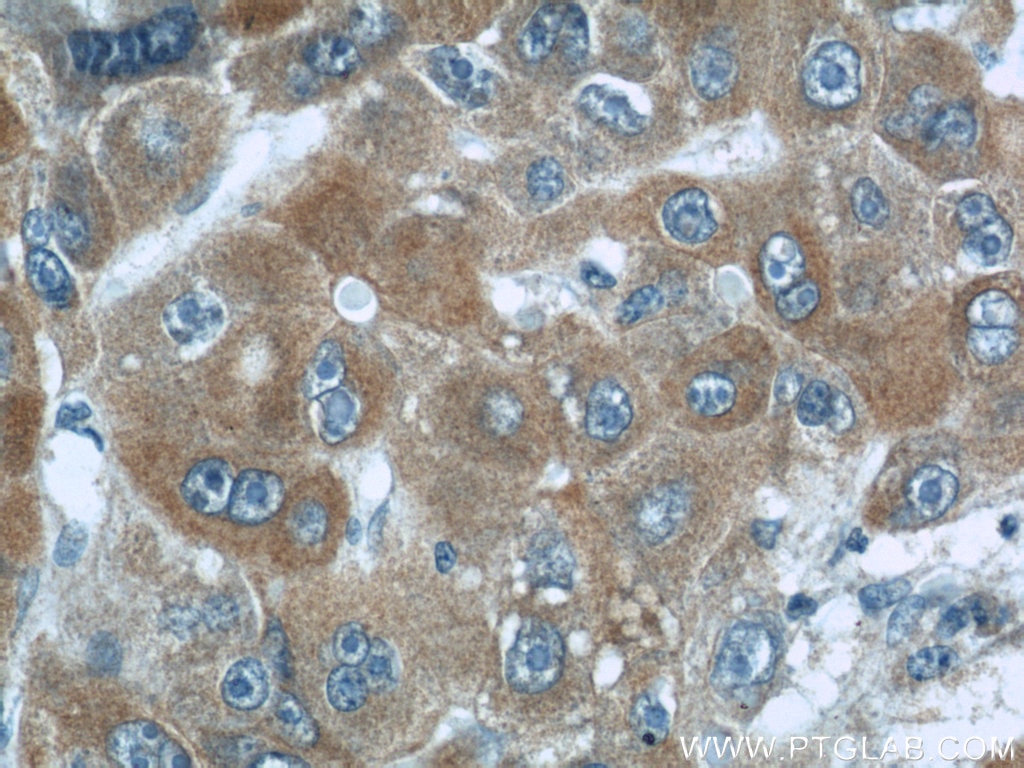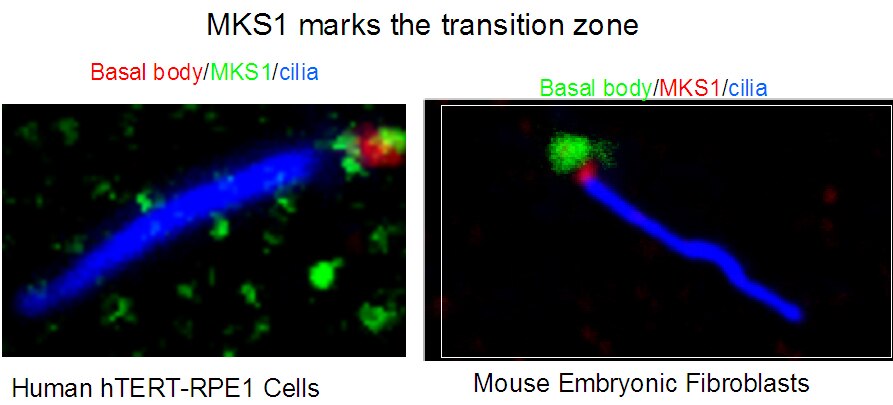Tested Applications
| Positive WB detected in | HEK-293 cells, HeLa cells, mouse uterus tissue, SH-SY5Y cells |
| Positive IP detected in | HEK-293 cells |
| Positive IHC detected in | human liver cancer tissue Note: suggested antigen retrieval with TE buffer pH 9.0; (*) Alternatively, antigen retrieval may be performed with citrate buffer pH 6.0 |
| Positive IF detected in | hTERT-RPE1 cells and Mouse embryonic fibroblasts |
Recommended dilution
| Application | Dilution |
|---|---|
| Western Blot (WB) | WB : 1:500-1:2000 |
| Immunoprecipitation (IP) | IP : 0.5-4.0 ug for 1.0-3.0 mg of total protein lysate |
| Immunohistochemistry (IHC) | IHC : 1:50-1:500 |
| Immunofluorescence (IF) | IF : 1:20-1:200 |
| It is recommended that this reagent should be titrated in each testing system to obtain optimal results. | |
| Sample-dependent, Check data in validation data gallery. | |
Published Applications
| WB | See 7 publications below |
| IF | See 23 publications below |
Product Information
16206-1-AP targets MKS1 in WB, IHC, IF, IP, ELISA applications and shows reactivity with human, mouse, rat samples.
| Tested Reactivity | human, mouse, rat |
| Cited Reactivity | human, mouse |
| Host / Isotype | Rabbit / IgG |
| Class | Polyclonal |
| Type | Antibody |
| Immunogen |
CatNo: Ag9177 Product name: Recombinant human BBS13 protein Source: e coli.-derived, PGEX-4T Tag: GST Domain: 1-321 aa of BC010061 Sequence: MTTAASEVPSFLVERMANVRRRRQDRRGMEGGILKSRIVTWEPSEEFVRNNHVINTPLQTMHIMADLGPYKKLGYKKYEHVLCTLKVDSNGVITVKPDFTGLKGPYRIETEGEKQELWKYTIDNVSPHAQPEEEERERRVFKDLYGRHKEYLSSLVGTDFEMTVPGALRLFVNGEVVSAQGYEYDNLYVHFFVELPTAHWSSPAFQQLSGVTQTCTTKSLAMDKVAHFSYPFTFEAFFLHEDESSDALPEWPVLYCEVLSLDFWQRYRVEGYGAVVLPATPGSHTLTVSTWRPVELGTVAELRRFFIGGSLELEDLSYVRI Predict reactive species |
| Full Name | Meckel syndrome, type 1 |
| Calculated Molecular Weight | 559 aa, 65 kDa |
| Observed Molecular Weight | 65-70 kDa |
| GenBank Accession Number | BC010061 |
| Gene Symbol | MKS1 |
| Gene ID (NCBI) | 54903 |
| RRID | AB_10637856 |
| Conjugate | Unconjugated |
| Form | Liquid |
| Purification Method | Antigen affinity purification |
| UNIPROT ID | Q9NXB0 |
| Storage Buffer | PBS with 0.02% sodium azide and 50% glycerol, pH 7.3. |
| Storage Conditions | Store at -20°C. Stable for one year after shipment. Aliquoting is unnecessary for -20oC storage. 20ul sizes contain 0.1% BSA. |
Background Information
MKS1 (Meckel syndrome type 1 protein) is a 559-amino acid protein that contains a conserved B9 domain. It is a component of a large protein complex which localizes to the ciliary transition zone and regulates mammalian ciliogenesis and ciliary membrane composition (PMID: 21725307). MKS1 is required for ciliary structure and function, and is involved in centrosome migration to the apical cell surface during early ciliogenesis (PMID: 17185389; 19515853). Broad tissue expression of the MKS1 gene has been reported (PMID: 16415886). Defects in MKS1 are the cause of Meckel syndrome type 1 (MKS1), an autosomal recessive lethal malformation syndrome characterized by renal cystic dysplasia, central nervous system malformations, and hepatic developmental defects (PMID: 16415886). In addition, defects in MKS1 are also the cause of Bardet-Biedl syndrome type 13 (BBS13) (PMID: 18327255).
Protocols
| Product Specific Protocols | |
|---|---|
| IHC protocol for MKS1 antibody 16206-1-AP | Download protocol |
| IP protocol for MKS1 antibody 16206-1-AP | Download protocol |
| WB protocol for MKS1 antibody 16206-1-AP | Download protocol |
| Standard Protocols | |
|---|---|
| Click here to view our Standard Protocols |
Publications
| Species | Application | Title |
|---|---|---|
Nat Genet A transition zone complex regulates mammalian ciliogenesis and ciliary membrane composition. | ||
Cell The spinocerebellar ataxia-associated gene Tau tubulin kinase 2 controls the initiation of ciliogenesis. | ||
Sci Adv Ciliopathy protein HYLS1 coordinates the biogenesis and signaling of primary cilia by activating the ciliary lipid kinase PIPKIγ. | ||
Nat Commun Microtubule asters anchored by FSD1 control axoneme assembly and ciliogenesis. | ||
Nat Commun An organelle-specific protein landscape identifies novel diseases and molecular mechanisms. |

